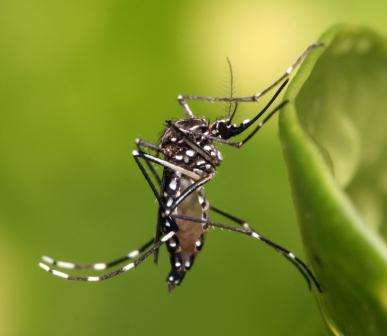Researchers use community-based approach to fighting dengue fever

(Medical Xpress)—Developing community consultation strategies based on local expectations and concerns can overcome misgivings about programs of biological control, even if that community was the place where the cane toad was first released.
Flinders Public Health researcher and social anthropologist Dr Darlene McNaughton headed a community consultation program that preceded the first field trials aimed at eliminating dengue fever by infecting the vector mosquitoes with a bacterium that prevents them from transmitting the disease.
Before field trials could take place, researchers needed to gain approval from residents in Cairns and in the two selected suburbs, chosen for their comparative isolation. One of them, Gordonvale, is next to the Little Mulgrave River, the location for the ill-fated release of the cane toad.
Dr McNaughton's report on the results of this process for the anti-dengue trial has been published in the journal PLOS Neglected Tropical Diseases.
The result of the two-year research and consultation program saw 86 per cent of the residents give permission for the trial to go ahead.
Dr McNaughton said the process was highly collaborative and aimed to provide multiple opportunities for residents to discuss and debate the science, the trials and their acceptability. It enabled the aims of the research to be explained, and also provided a range of often new information about dengue fever and the mosquito (Aedes aegypti, pictured) that transmits it.
An initial round of direct contact enabled a wide range of concerns and issues raised by the residents to be identified and answered. These were incorporated into the design of the formal engagement and consultation.
"And as the scientists admitted, the questions they asked were very good questions indeed," Dr McNaughton said. The issues often mirrored those being explored by the scientists, including efficacy and duration.
More than 140 community presentations also enabled a range of misconceptions to be corrected – as well as mistaken beliefs about the types of mosquito that carries the fever, many people did not realise that dengue is a human virus and that the mosquitoes act only as inadvertent transmitters. There was also a mistaken belief that the mosquitoes travelled long distances and bred in swamps, puddles and creeks, when in fact their range is very localised and focuses on water holding containers at sites of human habitation.
Part of the successful strategy was to present the information face-to-face and to give comprehensive information that included both pros and cons, Dr McNaughton said.
"People didn't want slickly packaged media campaigns. They saw the opportunity to ask questions, discuss, debate and detail what they expected to see in place before they would give their approval as being very important, including independent assessment of the science and approval by a government regulator.
"Talking to people directly and over a period of time, identifying these issues and acting on them really helped to show respect, and build trust and mutual understanding," she said.
Because the composition and circumstances of local populations will always be different, Dr McNaughton said that it is important that systematic social research be used to inform and assess the consultation process.
"If projects plan to use open field trials, they need to be aware of and responsive to the needs, expectations, concerns, desires and knowledge of the communities whose backyards they hope to use as open laboratories."















